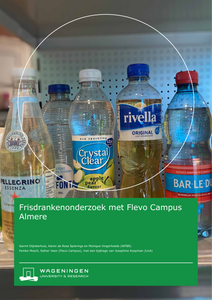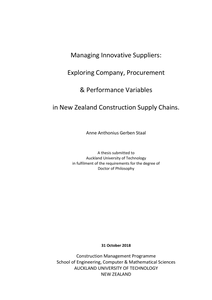This research paper conducts a review of the development of facilities management as a profession and some of the key moments in that journey. It then considers the situation of New Zealand, which has a number of characteristics such as a small population, relatively few large organisations which might make use of Facilities Management (FM) at a strategic level, and an understanding of FM which is more about operational rather than strategic issues. Through the tool of a ‘World-Café’ methodology during an FM Masterclass at Auckland University of Technology (AUT) with members of FMANZ, New Zealand’s FM professional association, key issues in the development of FM professionals in New Zealand are discussed and recommendations made. It is interesting to note that the issues of professional recognition, career pathways and academic qualifications are all issues raised in the literature and also by participants in the World-Café session held. This suggests that New Zealand’s FM professionals are progressing through the same ‘growing pains’ as their colleagues in Europe faced in the 1990s. However, it also shows that FM in New Zealand is probably some 15 years behind Europe. The authors recognise that some of the reasons for this may be caused by the above-mentioned New Zealand characteristics. In addition to working on the development and recognition of a domestic FM industry in New Zealand, the authors also suggest that much could be learned from other FM players globally. Opportunities for further research include case studies of successful organisations and the development of an educational framework for New Zealand.
DOCUMENT

Light pollution is one of the fastest growing and most pervasive of environmental pollution (Chepesiuk, 2009). In the last couple of years, a lot of research has been done about the effects of light pollution. The interest in light pollution has been growing in many fields of science, extending from the traditional field of astronomy to atmospheric physics, environmental sciences, natural sciences and human sciences. Better insight in light pollution is likely to contribute to design and operation of Facility Management (FM) based on evidence. According to Cinzano, Falchi, & Elvidge (2001), the Netherlands is one of the countries with the highest amount of light pollution, just as the United States. A sample of students in the Netherlands and the United States has been taken to explore differences and similarities between the two countries.
DOCUMENT

In deze bundel doen we verslag van de onderzoeksprojecten die de leden van de kenniskring in de periode 2010-2012 hebben uitgevoerd in het kader van het hiervoor beschreven programma. Het startpunt van de meeste van deze onderzoeksprojecten werd gevormd door de onderzoeksresultaten van twee grote kwantitatieve onderzoeken naar loopbaanleren in het (v)mbo en het hbo. Beide onderzoeken lieten zien dat studenten pas in staat en bereid zijn zich actief met hun loopbaan bezig te houden, wanneer ze een leeromgeving wordt geboden die -zoals hiervoor al is opgemerkt- zowel praktijkgestuurd als vraaggestuurd is. Meer concreet betekent dit dat het leren vooral moet plaatsvinden op basis van/naar aanleiding van concrete praktijkproblemen, waarvoor door de studenten zelf een oplossing moet worden gevonden. De daarvoor noodzakelijke theorie moet worden aangeboden wanneer studenten merken dat ze zonder nieuwe concepten (c.q. zonder een andere probleemdefinitie) niet verder komen in het oplossen van het praktijkprobleem. Dit vereist een cultuuromslag in de school en een andere professionele identiteit bij docenten. Traditioneel is het leerproces immers theoriegestuurd: de theorie wordt aangeboden voordat studenten concrete ervaringen hebben met de praktijk(problemen). En zelfs als ze via stages e.d. deze ervaringen wel opdoen, blijft er een kloof bestaan tussen de lessen op school en de ervaringen die ze in bedrijven/instellingen opdoen. Deze kloof wordt weerspiegeld in de professionele identiteit van de docenten: een 'goede' docent wordt door de meeste docenten (en hun managers) gedefinieerd als een professional die met veel plezier en vakkundigheid tegen studenten spreekt over haar/zijn vakgebied. Nodig is echter - als men tenminste de stelling onderschrijft dat zelfsturing steeds belangrijker wordt - een professional die met studenten spreekt over hun ervaringen in en met de beroepspraktijk en op basis daarvan 'just in time' en 'just enough' theorie aandraagt. Uit het onderzoek dat verricht wordt binnen het lectoraat Pedagogiek van de Beroepsvorming blijkt dat docenten (en hun managers) erg veel moeite hebben met deze nieuwe rol. Allereerst omdat ze de concrete vaardigheden missen om met studenten een dialoog aan te gaan over de betekenis van hun praktijkervaringen voor het vormgeven van hun (levens)loopbaan.
DOCUMENT

Het onderzoek beschreven in dit rapport is een samenwerking tussen Flevo Campus en WFBR. Flevo Campus wil dat de consumentenkeuze voor frisdranken een meer bewuste en gezondere keuze wordt, niet alleen gedreven door nutriënteninformatie en prijs, maar ook gedreven door smaakbeleving en fun. Dit onderzoek belicht een aantal verschillende aspecten van frisdrankconsumptie door consumenten, gebaseerd op een: 1. inventarisatie van smaakprofielen in gebruik bij andere dranken, 2. literatuurstudie over de perceptie van verschillende soorten frisdrank, 3. historisch onderzoek 'frisdrank als cultureel symbool', 4. consumentenstudie onder 30 consumenten in Almere naar de groepering van verschillende soorten frisdrank, 5. online consumentenstudie naar de groepering van verschillende soorten frisdrank onder 164 consumenten.
DOCUMENT

In dit rapport is verslag gedaan van explorerend onderzoek naar de geldigheid van de opleidingscompetenties van Commercieel Management, bij een overgang van lineair naar circulair economisch model. Daarbij is vooral gezocht naar de eventuele gevolgen op het gebied van de marketingfunctie (marketing, marketingonderzoek en marketingcommunicatie) binnen bedrijven in een circulair economisch systeem.
DOCUMENT

Analyzing historical decision-related data can help support actual operational decision-making processes. Decision mining can be employed for such analysis. This paper proposes the Decision Discovery Framework (DDF) designed to develop, adapt, or select a decision discovery algorithm by outlining specific guidelines for input data usage, classifier handling, and decision model representation. This framework incorporates the use of Decision Model and Notation (DMN) for enhanced comprehensibility and normalization to simplify decision tables. The framework’s efficacy was tested by adapting the C4.5 algorithm to the DM45 algorithm. The proposed adaptations include (1) the utilization of a decision log, (2) ensure an unpruned decision tree, (3) the generation DMN, and (4) normalize decision table. Future research can focus on supporting on practitioners in modeling decisions, ensuring their decision-making is compliant, and suggesting improvements to the modeled decisions. Another future research direction is to explore the ability to process unstructured data as input for the discovery of decisions.
MULTIFILE

The research concerned semi-dyadic relations in SMEs and large companies that managed innovative suppliers in New Zealand construction supply chains. It explored effects of (independent) company variables on (mediating) procurement management variables, and also the effects of these variable types on (dependent) procurement performance variables when managing innovative suppliers.Exploratory interviews (N=5) revealed that innovation procurement seemed professional and logical within their contexts.Survey I (N=112) revealed that most case companies followed a product leadership strategy, and were equally entrepreneurial to innovative customers and innovative suppliers. They were innovative and gave innovative suppliers a dominant innovation role. They seemed to prefer radical innovations less than incremental innovations, but still somewhat more than New Zealand averages. Companies had slight preferences for new, small, or foreign suppliers for radical innovations. Innovations with supplier interactions were more beneficial to the company and the natural environment, than innovations without supplier interactions. Higher company innovation-benefits could equal higher environmental innovation-benefits. This profile differed from the profile of average companies in the construction supply chain.Survey I found weak correlations among output performance variables and process or proxy performance variables.Dependent (procurement and performance) variables were affected differently. Conversely, independent (company and procurement) variables had different effects.Different from extant literature, Survey I found limited statistically-significant effects of company variables on procurement management variables, and of these two variable types on performance. A minority (41%) of company variables affected procurement variables; only two company variables (13%) affected performance; a minority (40%) of procurement variables affected performance.Product leadership and NPD/innovation experience affected performance. Moreover, trust, lifestyle strategies and survival strategies affected procurement variables. Conversely, 27% of performance variables (satisfaction on marketing & sales; benefits for the natural environment) and 30% of procurement variables (entrepreneurial orientation with innovative suppliers, relation intensity with manufacturers, and small vs large suppliers for radical innovations) responded stronger on some company variables. Company size (<99 versus >250 staff) had little effects.Innovating, opportunity-seeking and trust towards innovative suppliers, and relation intensity with innovative service providers had highest effects on performance. Conversely, 46% of the performance variables (satisfaction with innovative suppliers, benefits for natural environment and company) responded stronger on innovating, opportunities-seeking and trust variables.Survey II (N=33) identified 12 procurement best-practices that respondents used for specific supplier or innovation types.Causality should be treated cautiously. Findings reflected the inconclusive results from extant literature. The research provided a nuanced and varied understanding on management of innovative suppliers, on the effects of entrepreneurial orientation to innovative suppliers, on the limited effects of company size, on the complex relations between various performance measures, and on entrepreneurship as a theoretical lens in innovation procurement. Companies had several options on how they managed their innovative suppliers. Additionally, the company characteristics and context of in this nascent research domain could be more important than commonly assumed from extant research.
MULTIFILE

Background: The number of people with multiple chronic conditions demanding primary care services is increasing. To deal with the complex health care demands of these people, professionals from different disciplines collaborate. This study aims to explore influential factors regarding interprofessional collaboration related to care plan development in primary care. Methods: A qualitative study, including four semi-structured focus group interviews (n = 4). In total, a heterogeneous group of experts (n = 16) and health care professionals (n = 15) participated. Participants discussed viewpoints, barriers, and facilitators regarding interprofessional collaboration related to care plan development. The data were analysed by means of inductive content analysis. Results: The findings show a variety of factors influencing the interprofessional collaboration in developing a care plan. Factors can be divided into 5 key categories: (1) patient-related factors: active role, self-management, goals and wishes, membership of the team; (2) professional-related factors: individual competences, domain thinking, motivation; (3) interpersonal factors: language differences, knowing each other, trust and respect, and motivation; (4) organisational factors: structure, composition, time, shared vision, leadership and administrative support; and (5) external factors: education, culture, hierarchy, domain thinking, law and regulations, finance, technology and ICT. Conclusions: Improving interprofessional collaboration regarding care plan development calls for an integral approach including patient- and professional related factors, interpersonal, organisational, and external factors. Further, the leader of the team seems to play a key role in watching the patient perspective, organising and coordinating interprofessional collaborations, and guiding the team through developments. The results of this study can be used as input for developing tools and interventions targeted at executing and improving interprofessional collaboration related to care plan development.
DOCUMENT

Worldwide, sedentary behaviours and overweight are major health concerns. Most adolescents are insufficiently physically active and have overweight. Moreover, most work is sedentary or requires only light activity. And most people live in cities, a context which discourages participation in physical activity. How can we change this situation? An analogy between urban design and facility design is introduced to elucidate spatial properties that may be beneficial in both contexts. It is the purpose of this paper to use this analogy for the advancements of health and well-being of both workers and city dwellers.
DOCUMENT
